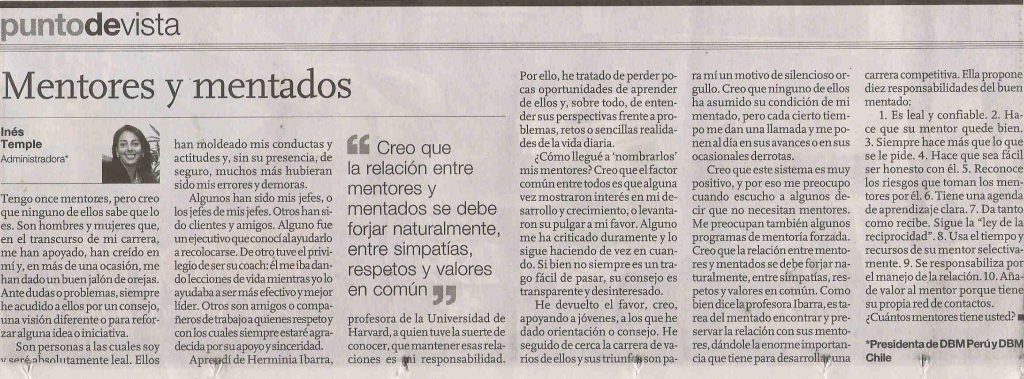Original Spanish version published in El Comercio newspaper (Peru) in November 21, 2016
I have eleven mentors, but I think none of them knows that they are. They are men and women who, in the course of my career, have supported me, believed in me, and, on more than one occasion, given me a good talking-to. When faced with doubts or problems, I have always come to them for advice, a different point of view, or to reinforce any idea or initiative.
They are people to whom I am and I will always be loyal. They have shaped my behavior and attitudes, and without their being there, I would certainly have made many mistakes and had many setbacks.
Some have been my bosses, or the bosses of my bosses. Others have been clients and friends. One was an executive that I met when helping him relocate. Another I had the privilege of being his coach: he gave me life lessons while I helped him to become a better leader. Others are friends or coworkers whom I respect and to whom I will always be grateful for their support and sincerity.
I learned from Herminia Ibarra —a professor at Harvard whom I had the good fortune to meet— that maintaining these relationships IS my responsibility. As a result, I have tried not to miss any opportunities to learn from them and, above all, to understand their perspectives when faced with problems, challenges, or the simple realities of daily life.
How did I get to “appoint” my mentors? I think the common denominator among all of them is that they showed interest in my development and growth, or gave me the thumbs up at one point or another. One has criticized me harshly, and continues to do so from time to time. While it may be a bitter pill to swallow sometimes, his advice is always transparent and disinterested.
I have returned the favor, I believe, by supporting young people to whom I have given guidance or advice. I have followed the career of several of them closely and their triumphs are for me a reason for quiet pride. I do not think that any of them has assumed their position as my mentee, but every so often they give me a call and they fill me in on their progress or on their occasional defeats.
I think this system is very positive, which is why I worry when I hear anyone say he or she does not need a mentor. I am also concerned about those forced mentoring programs that some companies impose. I think the mentor-mentee relationship must be forged naturally; amid mutual understanding, mutual respect and common values. As Professor Ibarra says, it is up to the mentee to find and look after the relationship with his or her mentors, giving it the enormous importance it has in developing a competitive career. She proposes ten tasks for good mentees:
How many mentors do you have?

The new normal is complex and challenging. Our best positive attitude will be decisive for us to ...
Good leaders seek and create network with other leaders. They know they are responsible for devel...
ncertainty, urgency, or crisis does not give anyone an excuse to be abusive, or act without respe...
Care for yourself by ensuring that you keep stress and workloads at manageable levels. Pass on go...
Original Spanish version published in El Comercio newspaper on April 26, 2020 Whe...
Published in www.ypo.org on September 11, 2020 I am still fascinated by the results of ...
The concerns, motivations, or problems of each team member, as well as the challenges and obstacl...
You are the head of the corporation that is you. Take 30 minutes each quarter to review how much ...
The key is to reframe your attitude so that you don’t fall behind. Recognize your advantages and ...
I continue to work in this and we are making headway, but more respect, empathy, and, sometimes, ...
It’s important to identify our level of employability, recognize its advantages and limitations, ...
Originally published in ceoworld.biz on May 21, 2019 The world of work has changed dramatically, ...
To improve employability, we need to persistently sharpen our work skills and social intelligence...
The challenge is to thoroughly understand our personal reactions to change and immediately focus ...
And yes, we deserve to give ourselves the opportunity to find a job that awakens our enthusiasm a...
Some time ago, I made a mistake, which like all of the mistakes we make, was completely involunta...
Remember that productivity and employability are intrinsically linked –the higher the level of em...
Of course, this is a huge challenge to personal discipline, but we have to appeal to professional...
I want a leader who inspires my respect and admiration for his/her serious, legitimate, and authe...
Original Spanish version published in America Economia (Peru) on September 22, 2016 Ma...
Original Spanish version published in El Comercio newspaper (Peru) on June 11, 2016 “I don’t like...
If you were patient enough to answer these questions and if you made the effort to write the answ...
Original Spanish version published in Aptitus magazine, on May 9, 2018 It is common to see c...
¿Cuántos de nosotros nos sentimos realmente hábiles en las redes? ¿Quién tiene tiempo de calidad ...
What a pleasure it is to help groups of Peruvians to allow themselves to dream and imagine a bett...
When traveling, you remember and compare the experience you had at each hotel where you stayed. ...
The way we answer and the quality of the ideas we express will differentiate us from the others w...
Original Spanish version published in America Economia (Latin America) on March 27, 2018 We ...
Original Spanish version published in El Comercio newspaper (Peru) on March 18, 2018 Twenty-...
Original Spanish version published in El Comercio newspaper (Peru), March 4, 2018 Regardless of t...
Original Spanish version published in El Comercio newspaper (Peru) on February 17, 2018 There are...
Original Spanish version published in El Comercio newspaper (Peru) on January 20, 2018 Hacking, i...
Translation of the original article published December 21, 2017 on América Economía (Latam) Some ...
Original Spanish version published in America Economia (Latin America) on October 23, ...
Original Spanish version published in El Comercio newspaper (Peru) on September 30, 2017 Man...
Original Spanish version published in America Economia (Latin America) on September 2, 2017 There...
Original Spanish version published in El Comercio newspaper (Peru) on July 22, 2017 And when I [&...
Translation of the original article published June 24, 2017 on El Comercio (Perú) Given all the n...
Original Spanish version published in El Comercio newspaper (Peru) on January 4, 2017 We all...
Original Spanish version published in El Comercio newspaper (Peru) on March 4, 2017 As a young [&...
Original Spanish version published in the El Comercio newspaper (Peru) on February 4, 2...
1.Good leaders lead (excuse the redundancy) for the greater good, not to build up their egos, [&h...
Some time ago I wrote about this same subject and was very pleased with the comments […]
Translation of the original article published July 23, 2016 on El Comercio (Perú). Tired of so m...
Original Spanish version published in El Comercio newspaper (Peru) on May 20, 2015 Who wants...
Original Spanish version published in El Comercio newspaper (Peru) on January 1, 2017 Advers...
Being perceived as young or old is now associated more with a series of behaviors and attitudes t...
It’s important to note that our facial expressions, gestures, and posture also send those valuabl...
Original Spanish version published in El Comercio newspaper (Peru) in November 21, 2016 I h...
Original Spanish version published in America Economia (Latin America) on October 28, 2016 As har...


